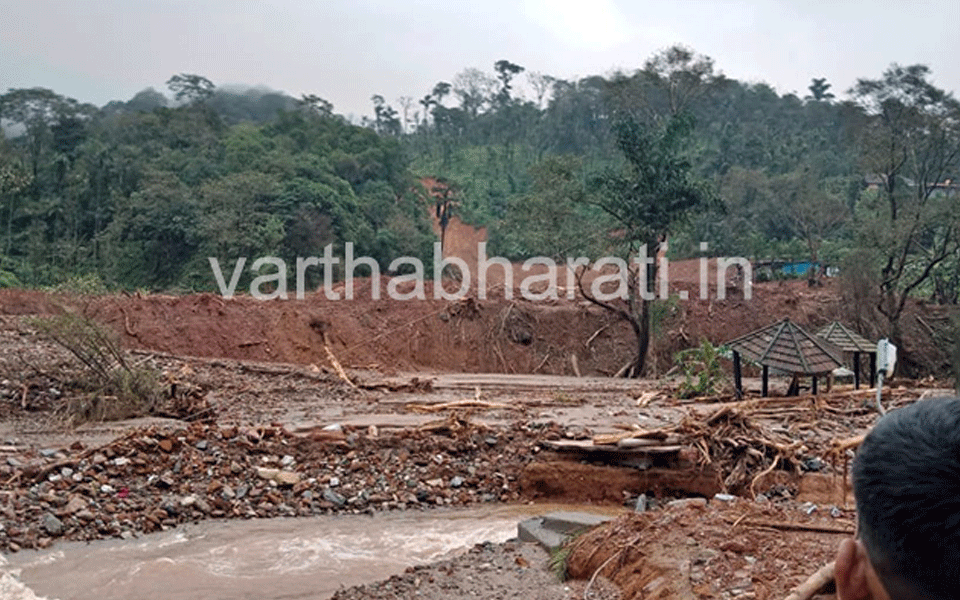- Team comprises 40-day-old baby, pregnant lady and elders
- Four youth lend helping hand
- ‘We’re happy that it was helicopter sound, but it was sound of landslide’
Madikeri, August 28: “It’s just a ten minutes walk from our house to Madikeri-Mangaluru main road. A stream is flowing along the road. Two bridges constructed across the stream were washed away in flood water. As a result, we have lost the only road to the village. Right in front of our eyes, the hills were sliding one after another like tippers dumping the sand. To save our lives, around 40 people including 40-day-old child, pregnant woman, children, women and 80-year-old aged person walked for kilometers crossing the hills, plains and streams to reach the relief camp”.
This is how MB Fayaz of Hodavada village in Madikeri taluk, who is studying his second B-Com in FMKMC College, explained the harrowing experiences of his family members and neighbours to save their lives amidst floods and landslides. They were settled in the relief camp at Darul Uloom Sunni Madrasa of Old Jumma Masjid.

MB Fayaz
“Our village is Made in Second Monnangeri in the taluk. On August 16 at 2 am, when the cliff behind our grandmother’s house collapsed, the house developed cracks and the flood water started gushing into the house. At this time, three persons who were sleeping inside the house escaped unhurt. Due to continuous rainfall, there was no light. As the water pipes were broken due to landslides, there was no drinking water to drink. There was no mobile network to call anyone. On August 17 morning, the land has developed cracks in several places and the walls of the houses also. Even the concretised road was also cracked. It was raining heavily. Streams and rivers were in overflowing. When the rain intensified, the two bridges constructed across the stream were collapsed and washed away in the flood water. Literally, we did not have any roads to go out of our village and we were worried”, he said.
“After some time, the hills were started to collapse in other places. Right in front of our eyes, our grandmother’s house was completely damaged in the landslide. We realized the danger of staying in the place and packed our luggage. As the two bridges were collapsed, it was impossible to reach the main road. Later, we have decided to reach Galibeedu village which is just opposite side of our village by climbing the hill range. It was not an easy task for us. We had with us total 40 members including 40-days-old baby and its mother, one-and-half-year-old child, 8 children below six years of age and five aged persons”, he explained.
“It was raining heavily and aged and children were finding it difficult to climb the hills as the soil was loose and slippery. When we reached little-bit elevated place, we got mobile network. Suddenly, we got the helicopter number from a police officer and called them for help. But the helicopter authorities denied to come as there was rough weather and they could not find which is village and which is hill range and disconnected the phone. Later, we called the army people who asked us to come to the main road. But we did not have the bridges to go to main road”, he recalled.
“Again we started to climb the hills. In spite of heavy rains, we travelled almost 4-5 kilometres with heavy backpacks and stopped at one point to remove the leeches from the legs. There was a stream before us. When we were removing the leeches, we heard a sound and we thought it was the sound of helicopter in front of us. But it was not the helicopter sound. Instead, it was the sound of landslide. At that moment, we had lost hope of our lives. Women and children were crying. But the mud came out of landslide did not come to us as it was washed away in the flood water and we were relieved. As the hill was collapsed, we returned to the place we have started our journey instead of crossing the stream”, he added.
“From there, we have crossed another stream and walked around four km. At this moment, we have confronted known persons Baranna, Dinesh, Nanda and Chethan who helped us to climb down the hill and cross a stream to reach a road. When we turned back, the hill we have climbed down also collapsed and the mud spread like a plain land. Later, we have crossed a small bridge on which the flood water was gushing forcefully. As we have passed some distance, we heard the noise of the collapse of that bridge”, he said.
“When we went forward, we found a home-stay where there were some people. They have given us some water. With the help of those four youth, we have crossed the plantation. At this moment, Chethan carried the 4-day-old child, while Sanjay carried the heavy luggage. They have the target of taking us to safe place Belaku Mani school. Finally, we have reached the school safely. We witnessed a road was sinking right in front of us. Later, we were taken to the relief camp in jeep”, he said.
“We have set out from our place at 9 am and reached the Belaku Mani School at 6.30 pm. From there, we were taken to the relief camp at 9 pm. To survive from the flood and landslide, we have travelled kilometers climbing the hills and crossing the rivers. Really, it was a great escape. We could not forget it in our life. Our homes and fertile coffee plantations were devastated in the nature’s fury. As we know, there were 194 houses around our village and among them, around 100 houses were disappeared and remaining houses are not fit to live. We don’t know where the government would provide us the place to live in”, said Fayaz.

























Let the Truth be known. If you read VB and like VB, please be a VB Supporter and Help us deliver the Truth to one and all.
Panaji (PTI): As part of a crackdown against tourist establishments violating laws and safety norms in the aftermath of the Arpora fire tragedy, Goa authorities on Saturday sealed a renowned club at Vagator and revoked the fire department NOC of another club.
Cafe CO2 Goa, located on a cliff overlooking the Arabian Sea at Vagator beach in North Goa, was sealed. The move came two days after Goya Club, also in Vagator, was shut down for alleged violations of rules.
Elsewhere, campaigning for local body polls, AAP leader Arvind Kejriwal said the fire incident at Birch by Romeo Lane nightclub at Arpora, which claimed 25 lives on December 6, happened because the BJP government in the state was corrupt.
An inspection of Cafe CO2 Goa by a state government-appointed team revealed that the establishment, with a seating capacity of 250, did not possess a no-objection certificate (NOC) of the Fire and Emergency Services Department. The club, which sits atop Ozrant Cliff, also did not have structural stability, the team found.
The Fire and Emergency Services on Saturday also revoked the NOC issued to Diaz Pool Club and Bar at Anjuna as the fire extinguishers installed in the establishment were found to be inadequate, said divisional fire officer Shripad Gawas.
A notice was issued to Nitin Wadhwa, the partner of the club, he said in the order.
Campaigning at Chimbel village near Panaji in support of his party's Zilla Panchayat election candidate, Aam Aadmi Party leader Kejriwal said the nightclub fire at Arpora happened because of the "corruption of the Pramod Sawant-led state government."
"Why this fire incident happened? I read in the newspapers that the nightclub had no occupancy certificate, no building licence, no excise licence, no construction licence or trade licence. The entire club was illegal but still it was going on," he said.
"How could it go on? Couldn't Pramod Sawant or anyone else see it? I was told that hafta (bribe) was being paid," the former Delhi chief minister said.
A person can not work without bribing officials in the coastal state, Kejriwal said, alleging that officers, MLAs and even ministers are accepting bribes.





